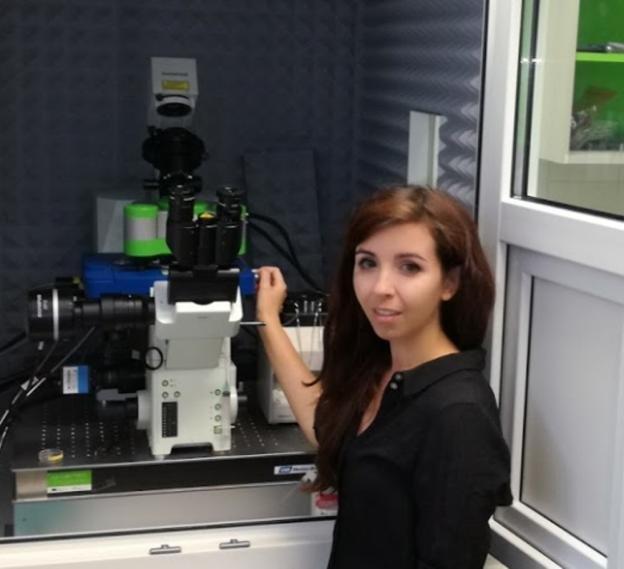Dr Jan Pribyl is Deputy Group Leader in the research group of Professor Petr Skládal at Masaryk University, Brno in the Czech Republic. The main research aim of the group was to develop electrochemical and acoustic (QCM) biosensors. This provided the motivation to use AFM. The plan was to use this high resolution imaging technique to visualize biomolecules, nanoparticles and/or other nanostructured objects on the surface of solid, non-transparent biosensor transducers (electrodes). This work started some nine years ago but the main step forward occurred with the purchase of the JPK NanoWizard® AFM and ForceRobot® in 2014. These are located at the Nanobio Core Facility, part of CEITEC. Used intensively for over three years now, they provided the combination of AFM with an inverted optical microscope, a sophisticated system that enabled force-mapping which allowed the group to start intensive research on living cell cultures. The key difference of the JPK systems from other AFMs available in the laboratory has been the ability to easily image bio samples in liquid.
The work to date has looked at various types of sample. These include cardiomyocytes – where the biomechanical properties such as force and beating rate can easily recorded by AFM when used with a properly calibrated cantilever on the surface of the cardiomyocyte cluster. Cluster may be kept in a standard Petri dish, held by JPK’s PetriDishHeater™. The contents of the Petri dish can be changed using integrated tubes which enable solutions of drugs affecting cardiomyocyte properties to be studied such as the effect of various compounds on biomechanical properties of different types of cardiomyocytes.
Another sample set was CAL51 (a breast cancer cell line) – Hippo effectors YAP/TAZ act as on–off mechanosensing switches by sensing modifications in extracellular matrix (ECM) composition and mechanics. The group has used AFM nanoindentation to monitor changes in cellular stiffness, when the activity of these switches was affected.
The effect of the mechanical properties of supporting materials on the stiffness of fibroblasts grown on such surface has been investigated. Other parameters, such as cell morphology and actin fiber structure are evaluated simultaneously. Also, the mechanical properties of young plants in the area of hypocotyl and roots may be studied to illustrate differences between different plant mutants. These experiments are performed on living plant organisms under near in-vivo conditions. These and other experiments have been written up and published – see references below.
Asked about the reasons he likes to use the NanoWizard®, Dr Pribyl had much to say. “First of all, the combination with optical (fluorescence) microscopy must be mentioned. We mostly use the JPK AFM system work with living cells, where the optical image is essential. Fluorescence emission is monitored, when cells with expressed YFP/GFP protein are localized. We are upgrading our Olympus microscope with an Andor Zyla sCMOS camera which can be interfaced with the JPK software allowing direct overlay of optical and AFM images. This will bring us a new potential for cell research.” Other key benefits he gets from the system include robustness of operation when imaging/analysing hundreds of cells in a year.
The QI™ mode (quantitative imaging) is more than just a quantitative approach. As Dr Pribyl says, “I personally appreciate the precise driving of the tip contact with the sample in each point of the visualized area by keeping the constant force during the short force-distance curve measurements. This is especially useful for so called ‚problematic‘ samples, such as elastic materials (cells, hydrogels, etc.), where it is not easy to perform imaging using the standard imaging modes such as contact and AC mode.”
For more details about JPK’s AFM systems and their applications for the materials, life & nano sciences, please contact JPK on +49 30726243 500. Alternatively, please visit the web site: www.jpk.com or see more on Facebook: www.jpk.com/facebook and on You Tube: http://www.youtube.com/jpkinstruments.
JPK Instruments AG is a world-leading manufacturer of nanoanalytic instruments – particularly atomic force microscope (AFM) systems and optical tweezers – for a broad range of applications reaching from soft matter physics to nano-optics, from surface chemistry to cell and molecular biology. From its earliest days applying atomic force microscope (AFM) technology, JPK has recognized the opportunities provided by nanotechnology for transforming life sciences and soft matter research. This focus has driven JPK’s success in uniting the worlds of nanotechnology tools and life science applications by offering cutting-edge technology and unique applications expertise. Headquartered in Berlin and with direct operations in Dresden, Cambridge (UK), Singapore, Tokyo, Shanghai (China), Paris (France) and Carpinteria (USA), JPK maintains a global network of distributors and support centers and provides on the spot applications and service support to an ever-growing community of researchers.
JPK BioAFM | Bruker Nano GmbH
Am Studio 2D
12489 Berlin
Telefon: +49 (30) 670990 7500
Telefax: +49 (30) 670990 30
https://www.bruker.com/bioafm
Communications Manager
Telefon: +49 (30) 726243500
Fax: +49 (30) 726243999
E-Mail: bagordo@jpk.com
Talking Science Limited
Telefon: +44 (1799) 521881
Fax: +44 (7843) 012997
E-Mail: jezz@talking-science.com
![]()
